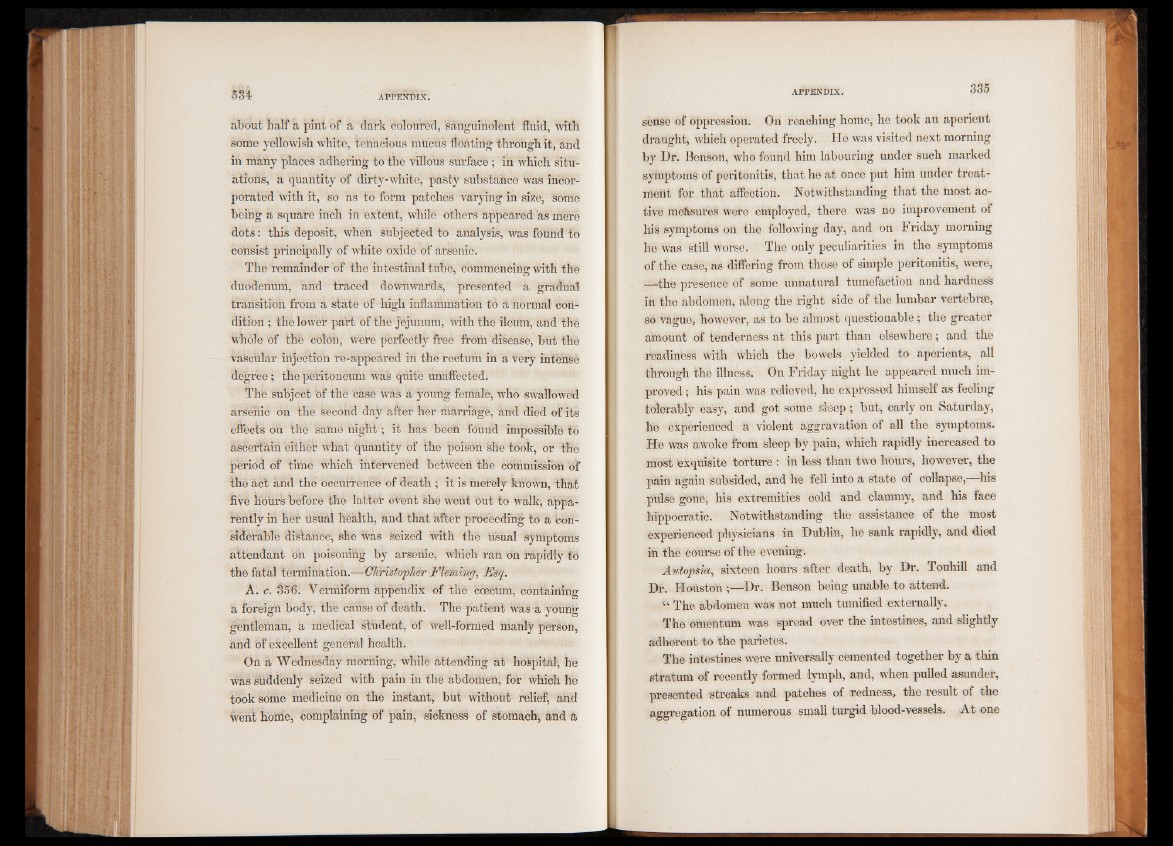
about half a pint of a dark coloured, Sanguinolent fluid, with
some yellowish white, tenacious mucus floating through it, and
in many places adhering to the villous surface ; in which situations,
a quantity of dirty-white, pasty substance was incorporated
with it, so as to form patches varying in size, Some
being a square inch in extent, while others appeared as mere
dots : this deposit, when subjected to analysis, Was found to
consist principally of white oxide of arsenic.
The remainder of the intestinal tube, cómmencing with the
duodenum, and traced downwards, presented a gradual
transition from a state of high inflammation to a normal condition
; the lower part of the jejunum, with the ileum, and the
whole of the colon, were perfectly free from disease, but the
vascular injection rë-âppCared in the rectum in a very intehse
degree ; the peritoneum was quite unaffected.
The subject 'of the case was à young female, who swalloWe'd
arsenic on the Second daÿ after her marriage, and died of its
effects Oh the saihe bight ; it has been found impossible to
àsèertain either whât quantity of the poison she took, or the
period of time which intervened between the cOthmiSsioh of
the act and the occurrence of death ; it is merely known, that
five hours before the latter event she went Out to walk, apparently
in her üsuàl health, and that after proceeding to a ‘considerable
distance, she was Seized with thé usual symptoms
attendant On poisonihg by arsenic, which ran on rapidly to
the fatal termination ‘^-GKristopJièr Fleininÿ, 'Esq.
A. c. §56. Vermiform appendix of the cæcum, containing
a foreign body, the cause of death. The patient was a young
gentleman, a medical student, of Well-formed manly person,
and of excellent general health.
On a Wednesday morning, whilè attending at hospital, he
wks suddenly seized with pain in the abdomen, for which he
took some medicine on the instant, but without relief, and
went home, complaining Of pain, sickness of stomach, and a
sense of oppression. On reaching home, he took an aperient
draught, which operated freely. He was visited next morning
by Hr. Benson, who found him labouring under such marked
symptoms of peritonitis, that he at once put him under treatment
for that affection. Notwithstanding that the most active
measures Were employed, there was no improvement of
Ills symptoms on the following day, and on Friday morning
he was still worse. The only peculiarities in the symptoms
of the case, as differing from those of simple peritonitis, were,
—the presence of some unnatural tumefaction and hardness
in the abdomen, along the right side of the lumbar vertebrae,
so vague, however, as to be almost questionable; the greater
amount of tenderness at this part than elsewhere; and the
readiness with which the bowels yielded to aperients, all
through the illness. On Friday night he appeared much improved
; his pain was relieved, he expressed himself as feeling
tolerably easy, and got some steep ; but, early on Saturday,
he experienced a violent aggravation of all the symptoms.
He was awoke from sleep by pain, which rapidly increased to
most exquisite torture : in less than two hours, however, the
pain again subsided, and he fell into a state of collapse,—his
pulse gone, his extremities cold and clammy, and his face
hippocratic. Notwithstanding the assistance of the most
experienced physicians in Dublin, he sank rapidly, and died
in the course of the evening.
Aitiopsia, sixteen hours after death, by Dr. Touhill and
Dr. Houston Dr. Benson being unable to attend.
“ The abdomen was not much tumified externally.
The omentum was spread over the intestines, and slightly
adherent to the parietes.
The intestines were universally cemented together by a thin
stratum of recently formed lymph, and, when pulled asunder,
presented streaks and patches of redness, the result of the
aggregation of numerous small turgid blood-vessels. At one